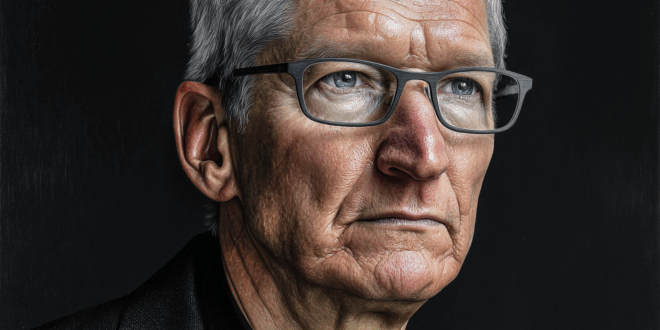John Ternus emerges as a potential successor to Tim Cook at the helm of Apple. Balancing heritage and renewal, he represents a measured transition towards a new vision.
As Tim Cook nears his 65th birthday, the question of his succession looms large within Apple. After more than a decade of leadership, the CEO is gradually paving the way for his departure. The potential successor seems to take shape in John Ternus, a respected engineer who has become one of Cupertino’s most prominent figures.
The Next Generation at Apple
For several months, signals have been multiplying. John Ternus, current Senior Vice President of Hardware Engineering, is gaining visibility.
He presents new products, represents the brand at major events, and increasingly embodies the future face of Apple.
Recently, he introduced the iPhone Air, led the launch of the iPhone 17, and personally welcomed the first customers at the Apple Store on Regent Street in London, a role once reserved for Tim Cook.
At 50 years old, he is the same age Tim Cook was when he succeeded Steve Jobs in 2011.
The stability of Apple’s leadership has long been one of its strengths. Under Cook, the company has maintained a cohesive executive team, limiting major departures over the years.
However, this cycle appears to be coming to an end. Several key executives, such as Chief Operating Officer Jeff Williams and Environmental VP Lisa Jackson, are considering retirement. The company is entering a phase of governance renewal, where the question of the future CEO becomes central.
Profile of John Ternus
In this context, John Ternus’s profile appeals to the board of directors. A trained engineer, he joined Apple in 2001 and has contributed to the design of flagship products such as MacBooks, iPhones, and AirPods.
His technical expertise, attention to detail, and leadership capabilities make him a credible figure for continuity. Tim Cook himself has gradually entrusted him with strategic responsibilities, including oversight of the most iconic products.
His rise accelerated after 2020. While other historical figures left the scene, John Ternus emerged as a pillar of hardware development.
He leads the teams responsible for Apple Silicon chips. Under his guidance, the transition from Intel processors to M-Series internal chips went smoothly.
His cautious and methodical approach contrasts with Steve Jobs’s style but aligns with Cook’s focus on disciplined management and sustainability.
Why is He the Favorite Candidate?
The challenges facing Apple make this choice even more strategic. The company still dominates the smartphone and high-end computer markets, but struggles to make its mark in emerging technologies.
Its projects in mixed reality, generative AI, and autonomous vehicles are progressing slowly. The profile of a product-oriented engineer like John Ternus seems to meet this need.
His experience allows him to understand technical constraints while guiding strategic decisions. Those close to him describe him as calm, precise, and demanding, valuing product quality as much as user experience.
His ability to collaborate with different divisions – design, software, marketing – is a rare asset within the company.
While the scenario of an immediate succession by John Ternus is not yet confirmed, a gradual transition seems to be taking shape. Tim Cook could, like Jeff Bezos or Bill Gates, remain involved as Chairman of the Board.





